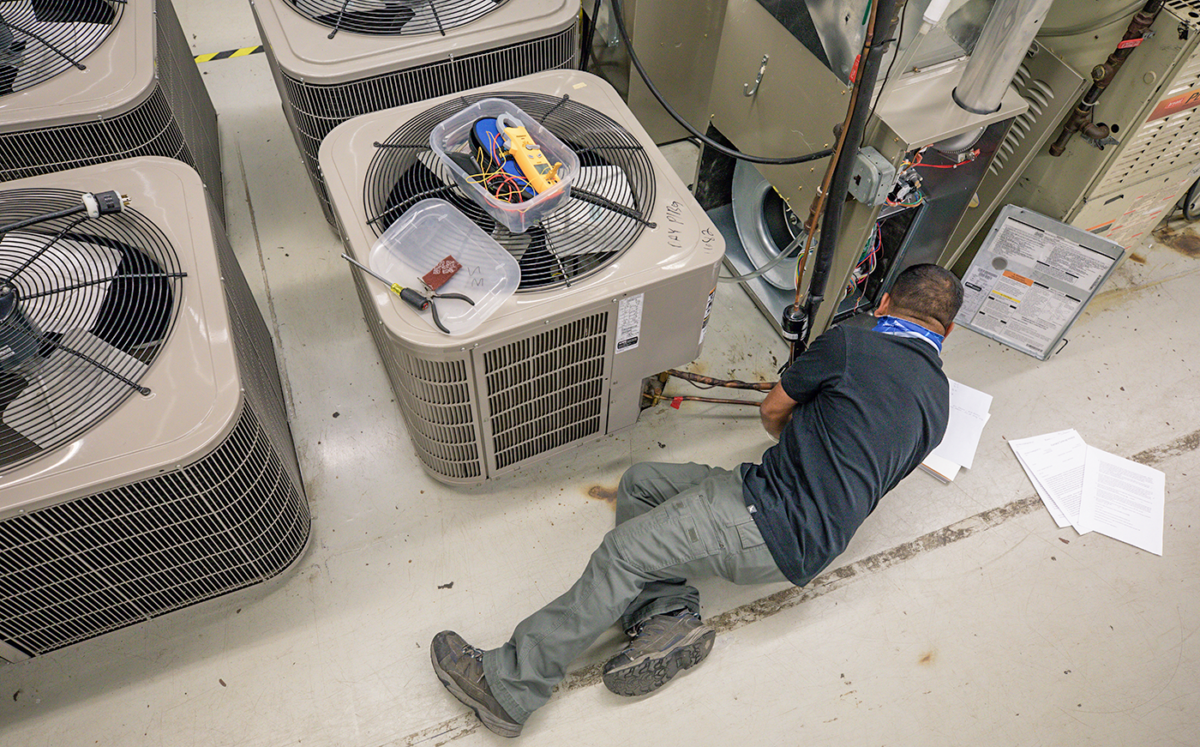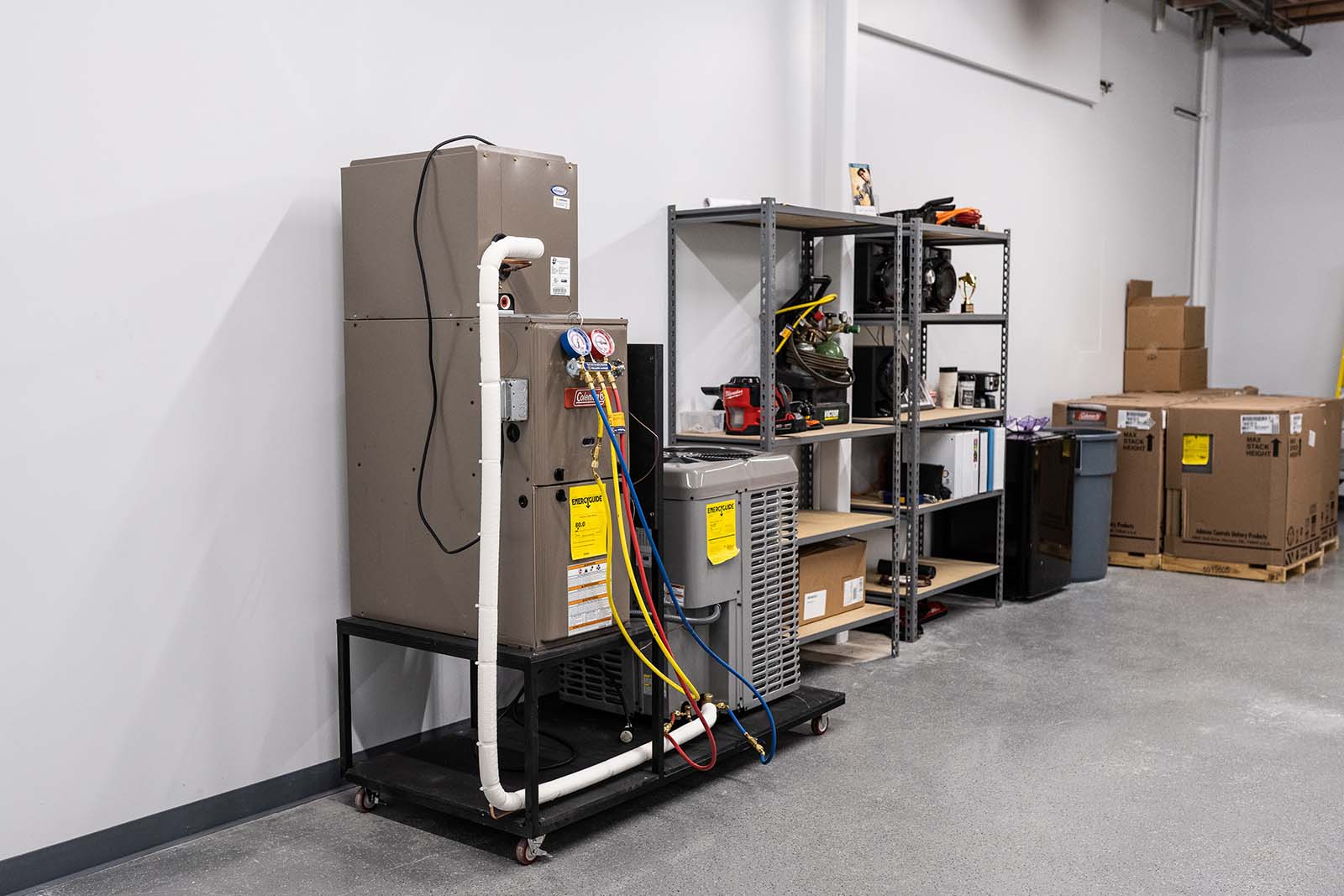Heating Contractor Specializing in Effective Home Heating Solutions
Heating Contractor Specializing in Effective Home Heating Solutions
Blog Article
An Extensive Appearance at HVAC Services and Their Effect On Power Efficiency and Cost Financial Savings
The role of heating and cooling services in enhancing energy effectiveness and accomplishing expense financial savings is more vital than ever, as services and homeowners look for sustainable solutions in a significantly eco-conscious world. With technical advancements like clever thermostats and high-efficiency components, the capacity for enhancing system efficiency is substantial. Yet, truth effect of these innovations depends mostly on normal upkeep and proactive concern management. As we check out the elaborate relationship between cooling and heating systems and operational expenses, consisting of the change in the direction of eco-friendly choices, the question occurs: exactly how can these approaches be efficiently implemented to take full advantage of both eco-friendly and economic benefits?

Significance of Heating And Cooling Equipments
cooling and heating systems are an essential part of modern-day structures, playing an important function in keeping healthy and balanced and comfortable indoor environments. These systems, incorporating ventilation, heating, and air conditioning, are essential for managing temperature, moisture, and air top quality, consequently ensuring the wellness of owners. Reliable a/c systems add considerably to developing an optimal indoor environment, which is important for both residential and business rooms.
In industrial buildings, a/c systems are integral to supplying a safe and effective environment. By regulating indoor climate conditions, these systems assist protect against the development of mold and mildew and the spread of air-borne impurities, thus securing the health and wellness of customers and staff members. In addition, in domestic setups, a/c systems improve living problems by offering regular thermal comfort and improving interior air top quality, which is vital for total health.
Furthermore, the style and upkeep of HVAC systems have a direct impact on energy intake and operational expenses. Effectively created and kept systems can substantially minimize power use, resulting in decreased energy expenses and a smaller sized carbon impact. The effectiveness of these systems thus plays a vital function in advertising sustainability and energy preservation within buildings, highlighting their value in the modern architectural landscape.
Advances in A/c Innovation
Development in HVAC modern technology is reinventing the method structures manage indoor environments, introducing a new age of performance and control. Current developments have focused on enhancing power intake while boosting user comfort. One significant development is the assimilation of wise thermostats, which make use of expert system to discover occupancy patterns and readjust temperatures as necessary, lowering unneeded energy use.
Variable Refrigerant Circulation (VRF) systems represent an additional substantial jump onward. These systems enable accurate temperature control in various areas of a building, enhancing comfort and reducing energy waste. VRF technology is specifically valuable for large industrial areas, providing adaptability and scalability.
Furthermore, the arrival of Net of Points (IoT) devices has actually transformed heating and cooling systems into interconnected networks with the ability of real-time data collection and evaluation. This connection enables anticipating upkeep, guaranteeing systems run at peak performance and lessening unexpected downtime.
Moreover, innovations in materials and design, such as using high-efficiency coils and compressors, have boosted total system efficiency - Heating Contractor. The adoption of eco-friendly refrigerants additionally emphasizes the sector's commitment to sustainability
These technological technologies are critical in decreasing operational expenses and ecological influence, establishing new standards for constructing climate monitoring.
Cooling And Heating Maintenance and Effectiveness
Ensuring ideal performance of heating and cooling systems expands past technological improvements; it also depends upon effective upkeep methods. Normal maintenance is important for sustaining effectiveness, minimizing power usage, and prolonging the life period of HVAC systems. The key goal is to make sure that all parts function at their peak possibility, consequently lessening power wastefulness and maintaining consistent interior comfort degrees.
Routine maintenance tasks, such as cleaning or replacing air filters, checking refrigerant levels, and checking ductwork for leaks, are vital for avoiding unneeded stress on the system. Dirty or stopped up filters can obstruct airflow, creating the system to function tougher and consume even more energy. Furthermore, poor cooling agent degrees can minimize cooling performance, leading to greater functional costs.
Additionally, regular inspections by certified experts can identify possible concerns before they escalate right into expensive repair work or system failings. These inspections usually include inspecting electric links, adjusting thermostats, and making sure the general honesty of the cooling and heating system. By resolving minor problems early, house owners and companies can stay clear of unforeseen breakdowns and boost energy effectiveness.
Economical HVAC Solutions
For those seeking to obtain one of the most out of their ventilation, air, and home heating conditioning systems without damaging the bank, discovering cost-efficient a/c solutions can make a considerable distinction. One instant procedure is to purchase programmable thermostats, which permit customers to set particular temperatures for various times of the day, optimizing energy use and reducing unnecessary usage. By automating temperature adjustments, homeowners can accomplish significant cost savings on energy bills.
Regular upkeep is an additional essential part of cost-effective a/c management. Making sure that filters are cleansed or replaced frequently, ductwork is secured, and units are serviced by specialists can prevent expensive repairs and improve system long life. Preventative maintenance not just keeps system effectiveness yet also aids in preventing unexpected malfunctions that can result in expensive emergency fixings.
Furthermore, retrofitting existing systems with energy-efficient components, such as variable speed motors or high-efficiency compressors, can be a sensible financial investment. These upgrades boost operational efficiency, minimize power use, and This Site can typically be executed at a portion of the expense of a complete system replacement.
Environmental Influence Reduction
Decreasing the ecological influence of a/c systems is important in today's quest of sustainable living. Cooling and heating systems are considerable factors to power intake, making up almost 40% of energy usage in commercial buildings. This energy need commonly depends on nonrenewable fuel sources, resulting in greenhouse gas exhausts and ecological degradation. Transitioning to a lot more efficient systems, such as those using sustainable power sources, can considerably minimize these effects.
Technical developments in HVAC design and operation, including the integration of wise thermostats and energy-efficient heatpump, are essential in minimizing carbon footprints. These advancements enable enhanced energy use, decreasing waste and boosting overall system performance. Furthermore, adopting routine upkeep techniques guarantees cooling and heating systems operate at peak performance, more curtailing unneeded energy consumption.
In addition, the use of eco-friendly cooling agents is crucial, as standard refrigerants, like CFCs and HCFCs, have been terminated due to their ozone-depleting residential or commercial properties. Modern alternatives, such as hydrofluoroolefins (HFOs), offer lowered ecological threats, aligning with global ecological methods. By embracing these lasting practices, heating and cooling services can play a transformative function in lowering environmental impacts, promoting power effectiveness, and cultivating an extra sustainable future.
Final Thought

Moreover, the style and upkeep of Cooling and heating systems have a direct impact on power consumption and functional costs. Normal upkeep is important for hvac air handler maintaining performance, minimizing power intake, and prolonging the life period of Cooling and heating systems. Cooling and heating systems are substantial contributors to energy intake, accounting for nearly 40% of power usage in industrial buildings. In addition, embracing regular maintenance techniques makes sure A/c systems run at peak effectiveness, more curtailing unnecessary energy intake.
The transition to eco friendly A/c systems further Get the facts decreases operational costs and advertises sustainability. (Heating Contractor)
Report this page